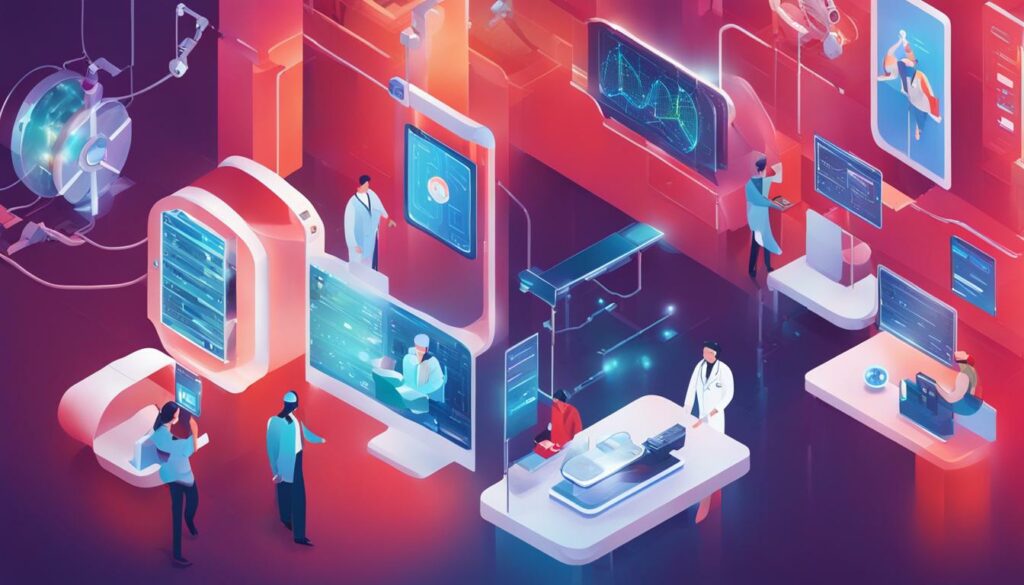As the world experiences an unprecedented rise in population, healthcare systems worldwide are facing significant challenges. Adapting to healthcare systems worldwide and effectively navigating the complexities of global healthcare has become crucial in addressing the evolving needs of diverse populations and ensuring quality care delivery.
Key Takeaways:
- Adapting to healthcare systems worldwide is essential to meet the evolving needs of diverse populations.
- Effective navigation of global healthcare systems requires strategic adaptation and management.
- Healthcare organizations must address the complexities of healthcare delivery to ensure quality care.
- Proactive planning and strategic decision-making are vital in navigating the evolving healthcare landscape.
- Collaboration, innovation, and investment in healthcare education and training are critical in adapting to global healthcare systems.
The Importance of Scenario Planning in Healthcare
Scenario planning plays a crucial role in the healthcare industry, helping organizations anticipate and navigate the ever-changing landscape of healthcare systems. By considering various scenarios and their potential impact, decision-makers can proactively address uncertainties and challenges. This strategic tool enables healthcare leaders to shape effective strategies, foster innovation, and optimize resource allocation.
Scenario planning is essential for healthcare system transformation, as it provides a structured approach to navigate potential changes and challenges. By analyzing different scenarios, organizations can identify potential risks and opportunities, allowing them to adapt their approach and ensure successful implementation of healthcare system changes.
“Scenario planning is like a roadmap that guides healthcare organizations through their journey of healthcare system implementation and integration.”
The Benefits of Scenario Planning in Healthcare System Management
Implementing effective scenario planning in healthcare system management yields numerous benefits:
- Proactive Strategy Development: By exploring different scenarios, healthcare organizations can identify potential pitfalls and formulate strategies to address them. This proactive approach helps prevent reactive decision-making and enables organizations to stay ahead of the curve.
- Informed Decision-Making: Scenario planning equips decision-makers with a holistic understanding of potential outcomes and their implications. This comprehensive knowledge aids in making informed decisions that align with the organization’s goals and objectives.
- Enhanced Resource Allocation: With scenario planning, healthcare organizations can optimize resource allocation by identifying the areas of greatest need and allocating resources accordingly. This ensures that limited resources are used efficiently and effectively.
- Improved Patient-Centric Care: By incorporating patient perspectives into scenario planning, healthcare organizations can develop patient-centric care models that consider patient needs and preferences. This leads to improved patient satisfaction and better health outcomes.
Real-World Example: The Role of Scenario Planning in Pandemic Response
One notable example of scenario planning in healthcare is its application during the COVID-19 pandemic. Healthcare organizations around the world used scenario planning to model different potential outcomes, such as infection rates, hospital capacity, and vaccination rollout. These scenarios helped guide decision-making, resource allocation, and policy development, enabling healthcare systems worldwide to respond more effectively to the crisis.
Overall, scenario planning is a powerful tool that enables healthcare organizations to navigate the complexities of healthcare system management, address changing healthcare systems worldwide, and ensure the delivery of high-quality patient care. By embracing scenario planning, healthcare leaders can transform challenges into opportunities, proactively adapt to evolving healthcare systems, and effectively manage the healthcare needs of a growing global population.
Challenges Arising from a Growing Global Population
The growing global population presents various healthcare challenges that healthcare systems worldwide must address. The increasing demand for healthcare resources, including facilities, medications, and healthcare professionals, puts a strain on the system. This can result in shortages, longer waiting times for treatment, and potential declines in the quality of care provided.
In addition to resource allocation issues, attracting and retaining a skilled healthcare workforce becomes critical. Regions with high population density often experience a “brain drain” as qualified healthcare professionals seek opportunities elsewhere. This exacerbates the strain on healthcare systems worldwide and further compounds the challenges.
To tackle these healthcare challenges, efficient resource management strategies are essential. Effective allocation of resources can help alleviate shortages and ensure that healthcare facilities and professionals are equipped to meet the increasing demands. Additionally, investments in workforce development, such as training programs and incentives, can help build a skilled healthcare workforce capable of providing quality care to a growing global population.
Addressing the healthcare challenges posed by a growing global population requires a comprehensive and strategic approach. It necessitates a focus on resource allocation and workforce development to ensure sustainable healthcare systems worldwide capable of meeting the evolving needs of diverse populations.
Impact of Growing Global Population on Healthcare Resource Allocation
The growing global population significantly impacts resource allocation within healthcare systems worldwide. As the demand for healthcare services increases, there is a need to carefully distribute resources to ensure equitable access to care. This includes adequately staffing healthcare facilities, maintaining sufficient medical supplies, and prioritizing investments in infrastructure development.
| Challenges | Impact |
|---|---|
| Shortages of healthcare professionals | Longer waiting times for treatment, reduced access to specialized care |
| Inadequate healthcare facilities | Limited capacity to accommodate the growing population’s healthcare needs |
| Limited medical supplies | Potential delays in treatment and compromised patient outcomes |
| Inefficient infrastructure | Inadequate support for healthcare delivery and patient care |
Addressing the Healthcare Workforce Challenge
To address the challenge of attracting and retaining a skilled healthcare workforce, healthcare systems worldwide must focus on creating an environment that motivates healthcare professionals to remain in their respective regions. This can be achieved through competitive compensation packages, career development opportunities, and efforts to enhance work-life balance. Additionally, investing in educational programs and training initiatives can help develop a pipeline of healthcare professionals who are well-equipped to cater to the needs of the growing global population.
“Efficient resource allocation and strategic workforce development are vital to tackle the challenges arising from a growing global population. By optimizing resource management and investing in the healthcare workforce, healthcare systems can deliver quality care to those in need.”
Investments in Healthcare Resource Management
Efficient healthcare resource management is crucial in ensuring that resources are allocated effectively and equitably. Implementing technology-driven solutions, such as electronic health records and predictive analytics, can help optimize resource allocation and streamline processes. Additionally, collaborations between healthcare organizations and policymakers can result in better coordination of resources and improved healthcare outcomes for the growing global population.
Solutions for Mitigating Healthcare Challenges
To address the challenges presented by a growing global population, healthcare organizations can adopt various innovative solutions. These solutions encompass leveraging groundbreaking technologies in healthcare, embracing telemedicine, prioritizing preventive care, fostering global healthcare collaboration, and investing in healthcare workforce development.
Embracing Innovative Technologies
Innovative technologies play a pivotal role in transforming healthcare delivery and enhancing accessibility, particularly in remote and underserved areas. Leveraging technologies such as telemedicine and artificial intelligence (AI) enables healthcare professionals to remotely diagnose and treat patients, bridging geographical barriers and meeting the evolving needs of diverse populations.

Prioritizing Preventive Care
Preventive care measures, such as regular health check-ups and vaccinations, are key to reducing the demand for acute medical services and managing healthcare resources more efficiently. By promoting preventive care and implementing proactive health measures, healthcare organizations can enhance population health and reduce the burden on healthcare systems worldwide.
Global Healthcare Collaboration
Collaborative efforts among countries are essential for sharing knowledge, resources, and best practices to address specific healthcare challenges. By fostering global healthcare collaboration, organizations can optimize resource allocation, exchange expertise, and develop innovative strategies to meet the increasing demands of a growing global population.
Investing in Healthcare Workforce Development
Ensuring a competent healthcare workforce is crucial for providing quality care and meeting the needs of a growing population. Investing in education and training programs equips healthcare professionals with the necessary skills to navigate innovative technologies, adapt to evolving healthcare systems worldwide, and deliver patient-centered care. By prioritizing healthcare workforce development, organizations can address the challenges posed by a growing global population and ensure a sustainable healthcare workforce.
In summary, embracing innovative technologies, leveraging telemedicine, prioritizing preventive care, fostering global healthcare collaboration, and investing in healthcare workforce development are vital solutions for mitigating the challenges posed by a growing global population. By adopting these strategies, healthcare organizations can enhance healthcare accessibility, optimize resource allocation, and meet the evolving needs of diverse populations.
The Role of Digital Health Solutions in Adapting to Global Healthcare Systems
Digital health solutions are revolutionizing healthcare accessibility and delivery, playing a crucial role in adapting to global healthcare systems worldwide . These innovative technologies, including telemedicine, remote patient monitoring, and artificial intelligence-driven diagnostics, are transforming the way healthcare is provided, particularly in areas with limited resources.
Telemedicine allows patients to access medical care remotely through video consultations, eliminating geographical limitations and reducing the need for in-person visits. This technology enables individuals in remote or underserved regions to receive the necessary healthcare without the burden of long travel distances or limited local healthcare facilities.
Remote patient monitoring is another digital health solution that empowers patients and healthcare providers to manage chronic conditions more effectively. Through wearable devices and IoT technology, patients can monitor their vital signs, track their medication adherence, and share real-time data with healthcare professionals. This approach not only enhances patient engagement and self-management but also enables proactive intervention, leading to improved healthcare outcomes.
Artificial intelligence-driven diagnostics are transforming the accuracy and efficiency of healthcare diagnosis and treatment planning. With advanced algorithms and machine learning capabilities, AI systems can analyze medical images, clinical data, and patient history to provide accurate and timely insights. These innovations assist healthcare providers in making informed decisions, optimizing treatment plans, and reducing diagnostic errors.
By embracing digital health solutions, healthcare organizations can enhance their ability to adapt to evolving healthcare systems worldwide and provide quality care to a growing global population. These technologies not only improve healthcare accessibility but also increase patient convenience, reduce healthcare costs, and enhance overall healthcare delivery.
Incorporating digital health solutions into global healthcare systems is crucial for overcoming barriers to healthcare access and providing equitable care to all individuals, regardless of their geographical location or resource constraints.
Benefits of Digital Health Solutions in Adapting to Global Healthcare Systems
Digital health solutions offer a myriad of benefits in adapting to global healthcare systems worldwide:
- Improved healthcare accessibility, particularly for remote and underserved populations
- Enhanced patient engagement and empowerment through remote monitoring and self-management
- Reduced healthcare costs through remote consultations and decreased hospital readmissions
- Timely and accurate diagnosis through AI-driven diagnostics, leading to improved treatment outcomes
- Efficient healthcare delivery and resource allocation
“Digital health solutions play a crucial role in bridging the healthcare accessibility gap and ensuring that individuals receive the care they need, wherever they are.”
By leveraging these technologies and integrating them into healthcare systems worldwide, the global population can benefit from more accessible, convenient, and patient-centered care. As healthcare organizations continue to adopt and expand digital health solutions, the future of healthcare delivery becomes increasingly promising, promising a world where quality care is within reach for all.
The Importance of Collaboration in Global Healthcare
Addressing the challenges posed by a growing global population requires collaboration on an international scale. By promoting global healthcare collaboration, healthcare organizations can overcome barriers and build more robust systems to meet the needs of a growing global population.
Collaborative efforts foster efficient resource allocation, enhance healthcare systems worldwide , and ensure expertise is transferred to address specific healthcare challenges. Countries can work together to tackle common healthcare issues by sharing best practices, knowledge, and resources.
Knowledge sharing plays a vital role in improving healthcare outcomes and driving innovation. When healthcare professionals from different countries come together to exchange their experiences and insights, they contribute to the development of healthcare best practices. By leveraging the collective knowledge, healthcare organizations can implement evidence-based strategies that lead to better patient care.
“Collaboration is the key to addressing the complex healthcare challenges we face today. By working together, we can leverage our strengths, share resources, and foster innovation to improve healthcare systems and outcomes worldwide.”
– Dr. Emily Johnson, Chief Medical Officer
Efficient resource allocation is another crucial benefit of global healthcare collaboration. Through collaboration, countries can pool their resources and expertise to address resource gaps and ensure equitable access to healthcare services. This cooperative approach facilitates the efficient distribution of healthcare resources, enabling healthcare organizations to provide quality care to a larger population.
Promoting Global Healthcare Collaboration
To foster collaboration in global healthcare, it is essential to create platforms for knowledge sharing and establish networks that facilitate cooperation among healthcare professionals and organizations worldwide. International conferences, webinars, and forums play a crucial role in bringing experts together to discuss healthcare challenges, exchange ideas, and brainstorm solutions.
Furthermore, global healthcare organizations can establish partnerships and twinning programs between institutions in different countries. These partnerships encourage learning, collaboration, and the exchange of best practices, enabling healthcare organizations to benefit from each other’s expertise and resources.
| Benefits of Global Healthcare Collaboration |
|---|
| Enhanced knowledge sharing and innovation |
| Improved resource allocation |
| Access to healthcare best practices |
| Increased capacity to address healthcare challenges |
| Broader perspective and diverse insights |
The importance of collaboration in global healthcare cannot be overstated. By working together, healthcare organizations can leverage the collective expertise, resources, and best practices to overcome challenges and improve healthcare outcomes for communities worldwide.
Investing in Healthcare Education and Training
Building a competent healthcare workforce is essential in meeting the demands of a growing global population. Investing in healthcare education and training programs equips aspiring healthcare professionals with the necessary skills and knowledge they need to thrive in an ever-evolving healthcare landscape. These programs play a vital role in developing skilled healthcare professionals who can adapt to changes, embrace innovation, and deliver patient-centered care.
Healthcare education programs focus on providing comprehensive training that covers a wide range of topics, including medical knowledge, patient care, communication skills, and ethical considerations. These programs not only impart the foundations of healthcare but also nurture critical thinking, problem-solving, and collaboration abilities, essential in addressing the complex challenges faced by healthcare professionals.
The training provided in these programs prepares healthcare professionals to navigate healthcare systems worldwide effectively and work collaboratively within interdisciplinary teams. By including practical experiences, such as internships, clinical rotations, and simulation-based training, aspiring professionals gain hands-on experience and develop the competencies required to excel in real-world healthcare settings.
Benefits of Investing in Healthcare Education and Training
- Adaptation to Evolving Healthcare Systems: Healthcare education programs equip professionals with the ability to adapt to the ever-changing healthcare landscape. By staying up-to-date with the latest advancements, practices, and technologies, healthcare professionals can effectively meet the evolving needs of patients and healthcare systems worldwide.
- Embracing Innovation: Healthcare education and training programs nurture a mindset that encourages healthcare professionals to embrace innovation. These programs instill a spirit of curiosity, creativity, and openness to new ideas, enabling professionals to contribute to the development and implementation of innovative healthcare solutions.
- Delivering Patient-Centered Care: Patients are at the heart of healthcare, and healthcare education programs place a strong emphasis on delivering patient-centered care. Professionals are trained to understand and prioritize the unique needs, preferences, and values of each patient, fostering a culture of empathy and compassion in healthcare organizations.
By investing in healthcare education and training, organizations can bridge the gap between the growing demand for skilled healthcare professionals and the available workforce. These programs cultivate a pipeline of competent professionals ready to address the challenges posed by a growing global population. Through continuous investment, healthcare organizations can ensure the availability of skilled healthcare professionals who are well-equipped to provide high-quality care, contribute to healthcare innovation, and shape the future of global healthcare.
Quote:
“Investing in healthcare education and training is an investment in the future of healthcare. By equipping healthcare professionals with the necessary skills and knowledge, we empower them to navigate complex systems, embrace innovation, and deliver compassionate care to a growing global population.” – Dr. Emily Thompson, Dean of Healthcare Education, Global University
Healthcare Systems Worldwide Recap
Adapting to healthcare systems worldwide is crucial in effectively addressing the challenges posed by a growing global population. The complexities of these healthcare systems require strategic navigation, and embracing key strategies such as scenario planning, innovative technologies, preventive care, collaboration, and education and training is essential.
By implementing these global healthcare strategies, healthcare organizations can optimize resource allocation, improve accessibility to healthcare, enhance care delivery, and develop a competent healthcare workforce. Proactive adaptation and management are necessary to meet the evolving needs of the global population and ensure the provision of quality care.
As the world continues to grow and change, healthcare systems worldwide must remain flexible and responsive. By adopting these approaches, healthcare organizations can effectively navigate the challenges of healthcare system adaptation, contributing to better health outcomes and a brighter future for the global population.
Learn More About International Travel Nursing
What are the challenges faced by healthcare systems worldwide?
Healthcare systems worldwide face challenges such as resource allocation, infrastructure development, and patient care due to the rise in global population.
How can healthcare organizations adapt to changing healthcare systems worldwide?
Healthcare organizations can adapt to changing healthcare systems worldwide through strategic scenario planning, which enables them to anticipate the future and develop proactive strategies.
What are the implications of a growing global population on healthcare systems worldwide?
A growing global population puts pressure on healthcare resources, leading to potential shortages, longer waiting times, and declines in the quality of care.
What solutions can be implemented to mitigate the challenges posed by a growing global population?
Solutions include adopting innovative technologies like telemedicine and artificial intelligence, prioritizing preventive care measures, and collaborating among countries.
How do digital health solutions help in adapting to global healthcare systems worldwide?
Digital health solutions such as telemedicine, remote patient monitoring, and AI-driven diagnostics enhance healthcare accessibility and delivery, particularly in underserved areas.
Why is collaboration important in global healthcare?
Collaboration fosters efficient resource allocation, enhances healthcare systems worldwide through knowledge sharing, and enables the transfer of expertise to address specific healthcare challenges.
Why is investing in healthcare education and training critical?
Investing in healthcare education and training programs helps build a competent healthcare workforce capable of meeting the demands of a growing global population.
How can healthcare organizations navigate global healthcare challenges?
Healthcare organizations can navigate global healthcare challenges by adapting to changing healthcare systems worldwide, embracing innovative technologies, and investing in workforce development.




